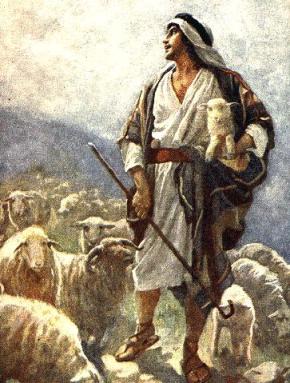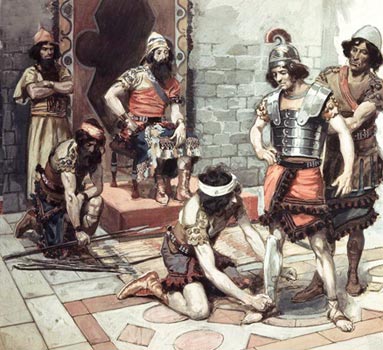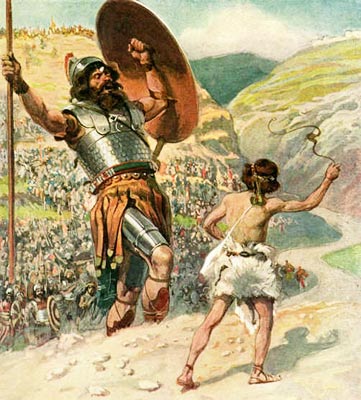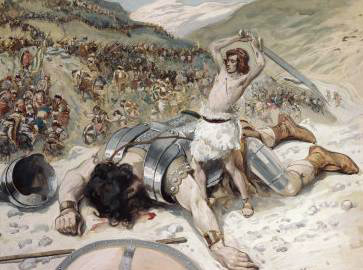One of my favorite stories in the Bible – and the Bible is full of stories – is about how God chose to use someone whom no one else would have thought qualified. That person wasn’t even a grown-up, just a teenager from a big family of the tribe of Judah in Israel. He was the youngest of a bunch of brothers and a couple of sisters. His name was David, and he knew God. David appears in the Bible for the first time when the prophet Samuel is led by the Lord to anoint him as the future king (1 Samuel 16). He was probably only thirteen or so on the day when he was summoned home from the sheep fields to be anointed by this stranger, his bemused brothers looking on. But something happened to David on that day. “Samuel anointed him and the Spirit of the Lord came mightily upon David from that day forward.” The spirit of the Lord came upon him? – God himself came to live in David in a powerful way.
The narrative then quickly moves to a battle scene (1 Samuel 17). Israel’s King Saul is fighting – again. “King Saul and the men of Israel were gathered in line of battle against the Philistines.” Israel? Battle? Philistines? Israel was God’s chosen people. God chose Israel. To be chosen is to be loved. God loved Israel, his people. He wouldn’t give up on them. His love is all about faithfulness. Battle? Many of the stories of the Bible are about God’s people fighting. Sometimes they fought for survival, but they also fought in order to take land and be established. They fought because God was commanding them and they fought to bring glory to his name. People only fight for things if they’re worth something. In fact, to fight for something is to declare its worth. It is to say, this king or this cause, this child or this friend, is worth fighting for. Or in other words, I am willing to suffer for this. Ask any winning athlete and they’ll tell you. Great cost, but it was worth it. Still today, we can see such battles all around us. Everything that costs us in building God’s kingdom is part of the fight. Striving after holiness. Defending God’s ways. Winning souls for God. It’s a fight. These days it’s “not against flesh and blood” but in those days the Philistines were the worst enemies of God’s people and this battle would go down in the history books.
Enter Goliath. “There came out from the camp of the Philistines a champion named Goliath, of Gath, whose height was six cubits…” Six cubits?! Well, these days that’s about 8 feet, 10 inches (2.7 metres). A giant just walked on stage. The narrator says, “He had a helmet of bronze …and was armed with a coat of mail, and the weight of the coat was five thousand shekels of bronze.” He was armed to the hilt. Just his coat weighed about 100 pounds (45 kg)! Talk about Heavy Metal. So he’s big and he’s strong. And then the giant begins his taunt: “He stood and shouted to the ranks of Israel, ‘Why have you come out to draw up for battle?’” In other words “You really shouldn’t have bothered getting out of bed. I’m going to kill you.” “Choose a man for yourselves, and let him come down to me. If he is able to fight with me and kill me, then we will be your servants; but if I kill him, then you shall be our servants.” Goliath lays down the challenge. In short: let’s save time, if one of your men can kill me, game over, you win. Of course, the odds are not worth betting on. Goliath has never lost. Knees buckle
When I was younger we used to play soccer in the park. Noone ever wanted to go in goals. “I have a bad back. It’s not my position. I went in goals last year.” It’s remarkable how quickly young men develop excuses. You can bet there were a few on that day. But then Goliath raises the stakes further, his outspoken pride unwittingly sealing his fate. “…I defy the ranks of Israel this day; give me a man, that we may fight together.” I defy! Another translation of the word is “blaspheme.” Yes he is taunting Israel. To defy Israel, however, is to defy Israel’s God. But make no mistake, it is no small thing to defy the living God. So what happens as these words fall on the ears of the King? What happens
as Israel hears these words?
Guess what. They start to be afraid. Really afraid. Earlier in the same book it talks about the men of Israel fearfully hiding in caves. You can imagine them having a hard look at the map to the caves again. “For forty days the Philistine came forward and took his stand, morning and evening.” Day after day, no one even tried to fight. Deeply Afraid. Shrinking soldiers. Impotent Israel. No one will fight. Nothing can be done. There is no hope… Or is there?
Scene change. We’re back in the sheep fields with the teenage shepherd, young David. David’s three eldest brothers were at the battle. His father asks David to take the boys some food. “Take these ten loaves, and carry them quickly to the camp to your brothers.” David sets off and comes “to the encampment, as the army was going forth to the battle line, shouting the war cry.” David went and “greeted his brothers. As he talked with them, behold, the champion …Goliath… came up out of the ranks of the Philistines, and spoke the same words as before.” Once again the giant begins his provoking, defying taunt. Then four simple words: “And David heard him.” David didn’t just hear him like you hear background music in a store. He heard him. He understood. He perceived that there was something significant going on here. It’s the kind of hearing that normally happens in slow motion in movies. Young David’s head slowly turning. His eyes meeting the giant’s. Who does he think
he is?
You can hear the indignation rightly rising in David. What are we going to do about this? Who does he think he is? He is defying our God! We have to act, brothers. Why is nobody doing anything about this?! “Eli'ab's anger was kindled against David, and he said, ‘Why have you come down?’” Eliab was David’s oldest brother. No.1 meets No. 8. I actually grew up with six younger brothers so I’m no stranger to the clashes. But older brothers, like Eliab and I, can too easily douse the youthful fire. David’s response to his ‘big brother’ is so human it’s almost comical. “’What have I done now?’ …And he turned away from him toward another, and spoke in the same way.” David won’t stop. Eventually even King Saul hears about David…. “and he sent for him.” Give me a place
in the battle
Saul retorts, “You are not able to go against this Philistine to fight with him; for you are but a youth, and he has been a man of war from his youth.” You can’t do it David. Why? Well Saul gives a couple of reasons. Firstly, you’re too young. And secondly, he’s a pro. This guy Goliath has made a career from killing people and you don’t even know what a Gillette Mach III is! Now Saul’s reasoning isn’t all that bad but he’s missing two crucial truths. Firstly, David has experience that Saul doesn’t know about – Saul underestimates David. But more significantly Saul misses the spiritual truth. David answers, “Your servant has killed both lions and bears; and this uncircumcised Philistine shall be like one of them, seeing he has defied the armies of the living God.” David believes that because Goliath has defied God, Goliath simply has no chance. The battle is the Lord’s. It’s not blind faith or youthful rashness, it’s truth-based courage.
Your clothes don’t
fit
“Then Saul clothed David with his armor.” Maybe a sign of official commission? Maybe it made him look more impressive? Maybe Saul just wants to protect him? Maybe the boy is so hidden in the armour as to reduce the embarrassment factor for Saul? All we know is that it doesn’t fit. “David then said to Saul, ‘I cannot go with these; for I am not used to them.’” Perhaps Saul expects David to do things the way he would. But David is young and he’s going to take an innovative approach. The goals remain, but the method looks different. Instead “he took his staff in his hand, and chose five smooth stones from the brook.”
Imagine the scene. The young boy appears on the battle field, the underdog gladiator on whom rests Israel’s future. “He drew near to the Philistine.” Much at stake. Hollywood can’t match this moment. Who knows if his brothers were aware of what was going on. Gasps. It’s David. What’s he doing? I can’t believe you let him out of your sight. Dad’s going to kill us… But this is David’s day. He is on stage. And no one else can take his turn. Approaching, Goliath sees him. “Am I a dog, that you come to me with sticks? Come to me, and I will give your flesh to the birds of the air …” You are not serious? Sending a little boy? A babe cannot win a war! David boldly proclaims: “You come to me with a sword and with a spear and with a javelin; but I come to you in the name of the Lord, the God of the armies of Israel, whom you have defied. This day the Lord will deliver you into my hand, and I will strike you down, and cut off your head.” Quite a speech. And then, the motor of his zeal, “…that all the earth may know that there is a God in Israel.” So that all the earth may know that God is alive! David declares his love. The fuel in David’s heart is the Spirit of God. And his seemingly risky, selfless action is so that God can be known. And so it begins.
He runs at him. He doesn’t even tentatively pick his steps like a predator about to pounce. He runs. “The battle is the Lord’s and he will give you into our hand. …David ran quickly toward the battle line to meet the Philistine.” Interestingly, David doesn’t say he will give you into my hand this time but our hand. Not only is he doing this so that all the earth may know that there is a God in Israel, he is also doing this on behalf of his people. “David put his hand in his bag and took out a stone, and slung it, and struck the Philistine on his forehead; the stone sank into his forehead, and he fell on his face to the ground.” A thud echoes in a stunned valley as six cubits of warrior hit the dust. Disbelief gives way to glory. What a day! What a victory! David has taken his turn! The Spirit spreads
Since God lives, David lives and as David lives out his call, the people around him come to life. Happy day
On that day David remembered the truth that God is alive. And it fired his hope. Whilst the people hid in their mental caves David rose to be fully alive. On that day young David stepped out – even against popular opinion. Whilst many preferred to wallow in selfish fear, David carried the flag, confident in God. On that day David took his place in the battle, he put himself on the line to bring glory to the name of the Lord. Fast forward
The story of David and Goliath ends with a brief interchange between David and the King: “And King Saul said to him, ‘Whose son are you, young man?’ And David answered, ‘I am the son of your servant Jesse from Bethlehem.’” Israel had more battles to fight, but years later a baby would be born in Bethlehem who would win once and for all. An anointed shepherd king, a descendant of David, would be born. One who would battle “Goliath” with a cross and usher in a new age for the whole human race. The battle is, and always was, the Lord’s.
|
. | |||||
|
publishing address: Park Royal Business Centre, 9-17 Park Royal Road, Suite 108, London NW10 7LQ, United Kingdom email: living.bulwark@yahoo.com |
. |
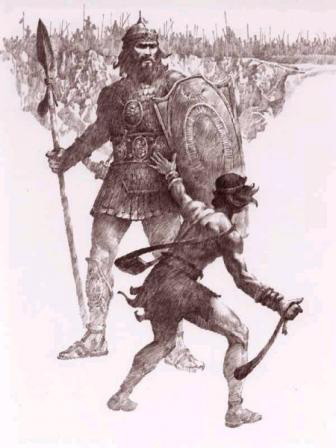
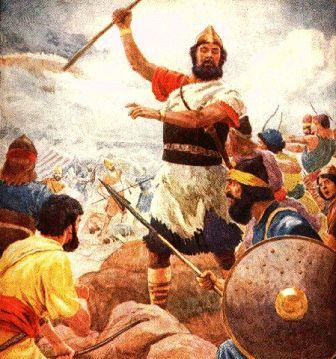
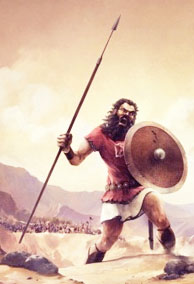 Goliath
– a giant of a killer
Goliath
– a giant of a killer
